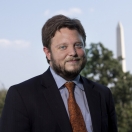
Speaking at the University of Texas at Austin, the President rattled off a couple campaign promises fulfilled -- like ending the War in Iraq and passing health reform – then turned to the economy:
And I said we need an economy that puts Americans back to work, an economy that’s built around three simple words -- Made in America. Because we are not playing for second place. We are the United States of America, and like the Texas Longhorns, you play for first -- we play for first.
From there he honed in even further to his primary focus for the day – education:
I’ve called for doubling our exports within the next five years, so that we're not just buying from other countries, I want us to sell to other countries. We've talked about doubling our nation’s capacity to generate renewable energy by 2012, because I'm actually convinced that if we control the clean energy future, then our economic future will be bright -- building solar panels and wind turbines and biodiesel. And I want us to produce 8 million more college graduates by 2020, because America has to have the highest share of graduates compared to every other nation.
But, Texas, I want you to know we have been slipping. In a single generation, we’ve fallen from first place to 12th place in college graduation rates for young adults. Think about that. In one generation we went from number one to number 12.
Now, that’s unacceptable, but it’s not irreversible. We can retake the lead. If we’re serious about making sure America’s workers -- and America itself -- succeeds in the 21st century, the single most important step we can take is make -- is to make sure that every one of our young people -- here in Austin, here in Texas, here in the United States of America -- has the best education that the world has to offer. That’s the number one thing we can do.
Now, when I talk about education, people say, well, you know what, right now we’re going through this tough time. We’ve emerged from the worst recession since the Great Depression. So, Mr. President, you should only focus on jobs, on economic issues. And what I’ve tried to explain to people -- I said this at the National Urban League the other week -- education is an economic issue. Education is the economic issue of our time.
It’s an economic issue when the unemployment rate for folks who’ve never gone to college is almost double what it is for those who have gone to college. Education is an economic issue when nearly eight in 10 new jobs will require workforce training or a higher education by the end of this decade. Education is an economic issue when we know beyond a shadow of a doubt that countries that out-educate us today, they will out-compete us tomorrow.
He touched on his innovative efforts to challenge states to live up to their potential in K-12 education through Race to the Top, then spoke passionately about higher education:
And this isn’t some abstract policy for me. I understand this personally, because Michelle and I, we had big loans to pay off when we graduated. I remember what that felt like, especially early in your career where you don’t make much money and you’re sending all those checks to all those companies. And that’s why I'm absolutely committed to making sure that here in America, nobody is denied a college education, nobody is denied a chance to pursue their dreams, nobody is denied a chance to make the most of their lives just because they can’t afford it. We are a better country than that, and we need to act like we’re a better country than that.
He spoke about the landmark reforms of student loans passed earlier this year that will cut out big banks as middlemen and redirect those resources to our students:
So as a result, instead of handing over $60 billion in subsidies to big banks and financial institutions over the next decade, we’re redirecting that money to you, to make college more affordable for nearly 8 million students and families across this country. Eight million students will get more help from financial aid because of these changes.
He spoke about Pell Grants, which so many students have come to rely on:
We’re tripling how much we’re investing in the largest college tax credit for our middle-class families. And thanks to Austin’s own Lloyd Doggett that tax credit is now worth $2,500 a year for two years of college. And we want to make it permanent so it’s worth $10,000 over four years of college -- $10,000.
He spoke about community colleges and HBCUs:
So that’s why we’re upgrading our community colleges, by tying the skills taught in our classrooms to the needs of local businesses in the growth sectors of our economy. And we’re giving companies an assurance that the workers they hire will be up to the job. We’re giving students the best chance to succeed. We’re also that way giving America the best chance to thrive and to prosper. And that’s why we’re also reinvesting in our HBCUs and Hispanic Serving Institutions like Huston-Tillotson and St. Edwards.
And finally, he spoke about lifting graduation rates:
Over a third of America’s college students and over half of our minority students don’t earn a degree, even after six years. So we don’t just need to open the doors of college to more Americans; we need to make sure they stick with it through graduation. That is critical.


